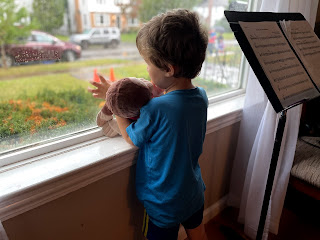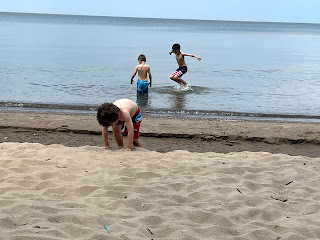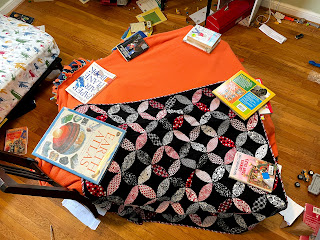2021 Reading
January
Basket Case (Carl Hiaasen)
Watership Down (Richard Adams)
The Eyes of the Heart (Frederik Buechner)
Odyssey Book 5 (Homer) in Greek
L’Appart (David Leibowitz)
Plan B (Jonathan Tropper)
Argonautica (Apollonius) in English
A Midsummer Night’s Dream (Shakespeare)
How (Not) to be Secular (James K.A. Smith)
My Year with Eleanor (Noelle Hancock)
The Wife Between Us (Greer Hendricks and Sarah Pekkanen)
La Chute (Albert Camus) in French
Christ, the Heart of Creation (Rowan Williams)
Odyssey, Book 6 (Homer) in Greek
Crime and Punishment (Fyodor Dostoevsky)
Nature Girl (Carl Hiaasen)
War on Peace (Ronan Farrow)
A Promised Land (Barack Obama)
February
Odyssey Book 7 (Homer) in Greek
This is Going to Hurt (Adam Kay)
You Are Not Alone (Greer Hendricks and Sarah Pekkanen)
Metamorphoses Book 3 (Ovid) in Latin
Of Mice and Men (John Steinbeck)
Infinite Jest (David Foster Wallace)
The Song of Achilles (Madeline Miller)
The Silence of the Lambs (Thomas Harris)
Native Tongue (Carl Hiaasen)
Rage (Bob Woodward)
The God Problem (Robert Wuthnow)
The Hobbit (J.R.R. Tolkein)
Troilus and Cressida (Shakespeare)
Lord of the Flies (William Golding)
March
No Longer Strangers (Greg Coles)
Le Jeu de l’Amour et du Hasard (Pierre de Marivaux) in French
Odyssey Book 8 (Homer) in Greek
The Idea of the Holy (Rudolf Otto)
Daddy-Long-Legs (Jean Webster)
Villages (John Updike)
Barchester Towers (Anthony Trollope)
Preface to Plato (Eric Havelock)
Wine Girl (Victoria James)
Icebound (Andrea Pitzer)
East of Eden (John Steinbeck)
The Case Against Education (Bryan Caplan)
The Jedi Doth Return (Ian Doescher)
The Ditch (Hermann Koch)
Everyday Drinking (Kingsley Amis)
The Deep Dark Descending (Allen Eskens)
The Finish (Mark Bowden)
Eiger Dreams (Jon Krakauer)
Lethal Passage (Erik Larson)
Moo (Jane Smiley)
Surprised by Scripture (N.T. Wright)
April
The Well Trained Mind (Susan Wise Bauer)
Counterpoint (Philip Kennicott)
The Moth and the Mountain (Ed Caesar)
Something Happened (Joseph Heller)
Three Cups of Deceit (Jon Krakauer)
Shameless (Nadia Bolz-Webber)
Odyssey Book 9 (Homer) in Greek
Metamorphoses Book 4 (Ovid) in Latin
One by One (Ruth Ware)
Squeeze Me (Carl Hiaasen)
K2, the Savage Mountain (Charles Snead Houston and Robert Bates)
The Language Instinct (Steven Pinker)
The Witches of Eastwick (John Updike)
Living with a Dead Language (Ann Patty)
The Alphabet of Grace (Buechner)
Sick Puppy (Carl Hiaasen)
The Great Gilly Hopkins (Katherine Paterson)
Classic Krakauer (Jon Krakauer)
What Einstein Told His Cook (Robert Wolke)
The Bonfire of the Vanities (Tom Wolfe)
Invictus (John Carlin)
Bridge to Terabithia (Katherine Paterson)
May
The Wednesday Wars (Gary D. Schmidt)
Natural Born Heroes (Christopher McDougall)
Now and Then (Joseph Heller)
No Fond Return of Love (Barbara Pym)
Troubled Blood (Robert Galbraith)
Music in the Castle of Heaven (John Eliot Gardiner)
Under a Flaming Sky (Daniel Brown)
Peak (Anders Ericsson and Robert Pool)
The Master of Disguise (Tony Mendez)
Catch-22 (Joseph Heller)
The Queen’s Gambit (Walter Tevis)
The Other Side of Everest (Matt Dickinson)
Le Voyage de Monsieur Perrichon (Eugene Marin Labiche and Edouard Martin) in French
The Godfather (Mario Puzo)
Sooley (John Grisham)
K2 (Ed Visteurs)
Let Me Tell You What I Mean (Joan Didion)
The Making of Biblical Womanhood (Beth Allison Barr)
June
Stormy Weather (Carl Hiaasen)
Odyssey Book 10 (Homer) in Greek
Pacific Crucible (Ian Toll)
Tourist Season (Carl Hiaasen)
Annapurna (Maurice Herzog)
All Creatures Great and Small (James Heriot)
Educated (Tara Westover)
A Breviary of Sin (Cornelius Plantinga)
Nomadland (Jessica Bruder)
The Cuckoo’s Calling (Robert Galbraith)
Jesus and John Wayne (Kristin Kobes du Mez)
The Maidens (Alex Michaelides)
The Conquering Tide (Ian Toll)
Holes (Louis Sachar)
All Things Bright and Beautiful (James Heriot)
Twilight of the Gods (Ian Toll)
July
The Silkworm (Robert Galbraith)
If You Lived Here You’d be Home By Now (Christopher Ingraham)
Musicophilia (Oliver Sacks)
Babette’s Feast (Isak Dinesen)
Career of Evil (Robert Galbraith)
Lethal White (Robert Galbraith)
Like Water for Chocolate (Laura Esquivel)
Kata Loukan in Greek
Death March; The Survivors of Bataan (Donald Knox)
The Princess Spy (Larry Loftis)
Metamorphoses Book 5 (Ovid) in Latin
Lovely War (Julie Berry)
A Delicate Truth (John LeCarre)
All Things Wise and Wonderful (James Herriot)
Espistles of Ignatius (in English)
This is Your Life (Meg Wolitzer)
Goddesses, Whores, Wives, and Slaves (Sarah B. Pomeroy)
The Ingenious Language (Andrea Marcolongo)
Agricola (Tacitus) in Latin
Savage Summit (Jennifer Jordan)
Mythos (Stephen Fry)
Dance of the Reptiles (Carl Hiaasen)
A Walk in the Woods (Bill Bryson)
Three Many Cooks (Maggy Keet, Pam Anderson, Sharon Damelio)
August
Stephen Fry in America (Stephen Fry)
The Fellowship of the Ring (Tolkein)
The Lord God Made Them All (James Herriot)
The Two Towers (J.R.R. Tolkein)
The Dig (John Preston)
The Return of the King (J.R.R. Tolkein)
The Premonition (Michael Lewis)
Complications (Atul Gawande)
The Burning (Tim Madigan)
You Are What You Love (James K.A. Smith)
Next: The Future Just Happened (Michael Lewis)
The Parthenon Enigma (Joan Breton Connelly)
Belinda, a Screenplay (Martha Smith)
Homer’s Daughter (Robert Graves)
Six Frigates (Ian Toll)
The Bomber Mafia (Malcolm Gladwell)
September
The Four Winds (Kristen Hannah)
Project Hail Mary (Andy Weir)
Daughters of Sparta (Claire Heywood)
Freedom (Sebastian Junger)
Come As You Are (Emily Nagoski)
Shape (Jordan Ellenberg)
Flyboys (James Bradley)
Young Men and Fire (Norman Maclean)
Odyssey Book 11 (Homer) in Greek
Count Belisarius (Robert Graves)
Everest the Cruel Way (Joe Tasker)
Drinking French (David Leibovitz)
A Midsummer Night’s Dream (Shakespeare)
Persuasion (Jane Austen)
Blue Bottle Craft Coffee (Caitlin Freeman, James Freeman, Tara Duggan)
October
High Crimes (Michael Kodas)
Titan (Ron Chernow)
Tinker, Tailor, Soldier, Spy (John LeCarre)
Lucky You (Carl Hiaasen)
All the President’s Men (Woodward/Bernstein)
The Story of the Bayeux Tapestry (David Musgrove, Michael Lewis)
Odyssey Book 12 (Homer) in Greek
Devil in the Grove (Gilbert King)
Home Game (Michael Lewis)
Facing the Mountain (Daniel Brown)
In Eutropium (Claudiun) in Latin
The Killing of Osama Bin Laden (Mark Bowden)
Denali’s Howl (Andy Hall)
The Righteous Mind (Jonathan Haidt)
Candide (Voltaire)
Cover-Up (Seymour Hersh)
November
Harry Potter et la Chambre des Secrets (Rowling) in French
Argo (Antonio Mendez)
Skin Tight (Carl Hiaasen)
Odyssey Book 13 (Homer) in Greek
Team of Rivals (Doris Kearns Goodwin)
Code Warriors (Stephen Budiansky)
Noise (Daniel Kahneman)
Chain of Command (Seymour Hersh)
Bringing the Heat (Mark Bowden)
Killing Pablo (Mark Bowden)
Coach (Michael Lewis)
John LeCarre-The Biography (Adam Sisman)
Belzhar (Meg Wolitzer)
The Utopia of Rules (David Graeber)
Sleepwalking (Meg Wolitzer)
December
Worm (Mark Bowden)
The Best Game Ever (Mark Bowden)
Cup of Gold (John Steinbeck)
Silverview (John LeCarre)
The Secret Sharer (Joseph Conrad)
Harry Potter and the Prisoner of Azkaban (J.K. Rowling)
The Judge’s List (John Grisham)
Harry Potter and the Goblet of Fire (J.K. Rowling)
Harry Potter and the Order of the Phoenix (J.K. Rowling)
Harry Potter and the Half-Blood Prince (J.K. Rowling)
Harry Potter and the Deathly Hallows (J.K. Rowling)
Out of the Silent Planet (C.S. Lewis)
Congo (Michael Crichton)
Perelanda (C.S. Lewis)
Sweet Thursday (John Steinbeck)
Liber Iob (St. Jerome) in Latin
After You Believe (N.T. Wright)
Odyssey, book 14 (Homer) in Greek
Beowulf (trans. J.R.R. Tolkein) in modern English
Finders Keepers (Mark Bowden)















































